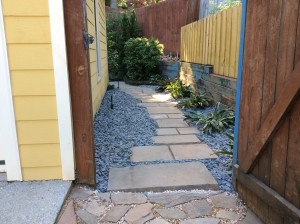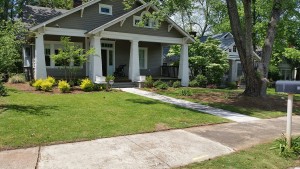
There is no one-time solution to keeping a lawn in good condition. Many of us want our lawn to have a single type of grass. A good start first step is to keep the lawn healthy. This requires multiple treatments throughout the growing season, but even before the first treatment, you should obtain a soil analysis to determine what your type of grass requires to be healthy. We recommend sending a sample to the Cooperative Extension Service in your County. The sample will be analyzed by the UGA Water and Soil Laboratory, and “do it your-selfers” will get a 3-year plan for correct chemical additions to your lawn. Adding the recommended nutrients should go a long way toward having that beautiful lawn with healthy plants that resist weeds, insect damage and disease.
There are two categories of lawn weeds. The first type sprouts in the fall as the soil cools, such as chickweed and annual bluegrass. The second type sprouts in the spring as the soil warms, such as crabgrass. Treatments in the spring and fall with the correct chemicals, such as pre-emergent herbicides, can kill these weeds as they sprout. Weeds that are already growing are not killed by these treatments, and may require an additional post-emergent herbicide treatment. This may happen if your lawn has existing weeds present. The reason for this is that you have a “seed bank” in the soil that may survive for several years, and will require a long-term program to gain control.

In Atlanta, we have two types of lawn. Summer grasses, such as Zoysia, Bermuda grass, centipede, and St. Augustine are dormant in the winter, then “green up” in the spring, grow all summer, then go dormant again in fall. The other common grass in Atlanta is tall fescue, which is a cool season grass that stays green all winter. Each of these grasses require their own program for optimum results, as they have different nutrition requirements.
Summer grasses should be fed after they have begun growing in the spring, about 75% green, again during the growing season, and again in the fall. Using combination products (Weed & Feed) wastes half the product. If the weed control product is in place early enough, the fertilizer is wasted. Fertilizing when the grass is green is too late for weed control.
Fescue should never be fertilized in the summer, as forcing top growth in hot weather makes the grass thin out and die, but should be fertilized in the cool season to encourage healthy root growth to help it survive the summer heat.
Our Lawn Chemical Maintenance Program will schedule 8 visits for zoysia, Bermuda grass, and fescue to apply pre-emergent herbicide, lime, and fertilizers at the correct time for your lawn. We include postemergent herbicide treatments if required to control growing weeds. Most healthy lawns mowed at the proper height for the season and with proper nutrient additions are able to resist insects and disease. In those rare events that require intervention, we are happy to assist our Customers with appropriate treatments.
Our landscapes in Atlanta usually have at least some lawn areas. We also usually have beds and borders containing shrubs, ground covers, and often some flowers to add color and interest. Keeping these areas attractive involves control of unwanted vegetation – a weed can be described as a plant growing where you don’t want it. There are three methods for weed control- mechanical, mulching, and chemical. Mechanical – hand weeding or cultivation – removes the unwanted plant or cuts it from its roots to die. Mulching is also effective by shading young plants. If they can’t get any light, they can’t grow. Chemical control can also be effective, particularly treatment with pre-emergent herbicides designed to kill weed seeds as they sprout. These chemicals will block growth of desirable seeds in the borders, but will not block growth of bedding plants such as annuals added for color. Hand weeding and planting stirs up the soil, exposing weed seeds lying dormant for years that may now sprout, adding new weeds to the border. Chemical control does not have to be used, but will usually provide better weed control less expensively than continued hand weeding.
Enter your zip code below to get
started on your custom quote.
